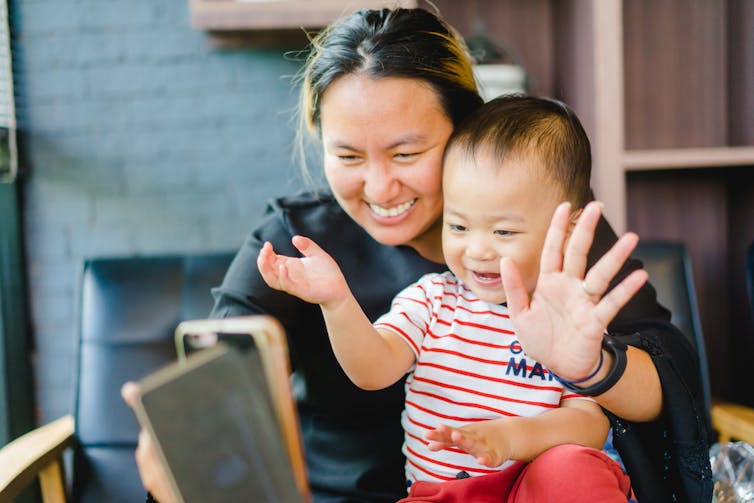Grandparent–grandchildren video calls are vital during COVID-19. Here are simple ways to improve them.
COVID-19 has seen a huge increase in video calling as we try to socially distance but still stay in touch.
This is particularly the case for grandparents and their grandchildren, who have either chosen to stay away, given the vulnerability of older people to coronavirus, or been forced apart due to lockdowns and border closures.
Read more: Video chats can ease social isolation for older adults during coronavirus pandemic
As researchers in early childhood, psychology and linguistics, we are studying how video calls fit into the lives of grandparents and their grandchildren and how we can enhance this interaction.
Our research
In a project with Western Sydney University’s BabyLab, we are surveying grandparents and parents about their experience of using video chat with children under the age of five, to capture the changes brought by COVID-19.
So far, 130 grandparents and parents from around Australia have responded.
Of those surveyed, on average, grandparents video call two to three times a week with their grandchildren, for about five to 10 minutes. They mostly used FaceTime and Facebook Messenger, as apps that are already available on their phones.
‘Being part of their lives’
About 40 per cent of grandparents surveyed began using video calls with their grandchildren for the first time during COVID-19. For all those surveyed, it was a mostly positive experience.
Grandparents say the calls allow them to stay connected with their grandchildren – with respondents talking about “being a part of their lives” and “not missing seeing them grow”.
One grandmother, who started using video chat with her granddaughter during COVID-19, said
I can see her and see her react to our voices and smile, which makes me feel good.
Another experienced user, with grandchildren overseas, also said
Because it’s so frequent – almost daily – I know their environment, it feels‚ normal. There’s no shyness, we can start a book one day and continue each day. We walk around theirs and my apartment and garden and I just feel part of their lives.
But there are challenges. Not surprisingly, the greatest challenge was maintaining children’s attention during the calls.
For some, the interaction was “artificial and detached”. As one parent said
It was more of a novelty than a way to have a genuine connection with people.
Other parents described the experience as stressful, noting the call had to be at the “right time”. As one parent noted of her one-year-old daughter, “she gets overstimulated and then will not go to bed”.
Some grandparents also expressed concern that it was an additional burden for parents and efforts were abandoned
I only did it once because it was too hard to fit into their already busy day.
What does this mean for ‘screen time’?
Many parents and grandparents we surveyed have questions about what increased video-calling means for ‘screen time’.
Is it harmful in any way for children? And for babies under 12 months – is there any benefit? Can it genuinely help such little ones remember their grandparents?
But video calls are not simply ‘screen time’. Rather, they offer an important opportunity for socialisation, as young children can still mimic the information typically available in face-to-face interactions.
Read more: Stop worrying about screen ‘time’. It’s your child’s screen experience that matters
The key appears to be the instant feedback that video offers. As recent research shows, one and two-year-old children can develop a social connection and learn the names of objects from someone they see and talk with via a video call.
Babies as young as four and five months prefer looking at images of faces over other toys and objects. This continues into their second year of life.
So, yes, you can engage a young child through FaceTime – and it can help their development.
But how can we optimise video calls with small children?
Tips for preparing for a video call
– Place your device on a firm surface, using your cover or something similar as a tripod to free your hands for gesturing and showing objects.
– Try to keep the light source in front of you, excessive sun glare behind you leads to poor quality video.
– Minimise background noise (such as the washing machine or radio).
– Make the call part of your routine, so children come to expect and get used to calls.
 Turn off the radio and minimise other background noises when making video calls. www.shutterstock.com
Turn off the radio and minimise other background noises when making video calls. www.shutterstock.com
– Make calls at a time of day when you can all relax – when babies are fed, changed and alert and older children are fed and not too tired.
– Before making the call, parents can share images, videos and messages describing new skills or activities since you last spoke, so grandparents have something to ask questions about and engage with.
– Prepare the child before the call to help manage their expectations. For example, ask them to pick out their favourite toy or drawing so they can show and talk about it.
– Start with shorter calls (around five minutes) and increase the length as you see fit.
Tips for keeping the call going
– For parents, consider making the video call as you do routine activities, such as cooking, sharing meals or bath time – this can bring grandparents into the day-to-day routine and reduce the stress of finding a time to call.
– As a grandparent, try to maintain eye contact and talk about things that baby or child is paying attention to at that moment.
– Use songs and games (‘pat-a-cake’ and ‘peekaboo’ are good examples) to capture babies’ attention. Musical statues is a good game to play with older children.
 Video calls are an important opportunity to learn social skills. www.shutterstock.com
Video calls are an important opportunity to learn social skills. www.shutterstock.com
– Make funny faces and hand gestures, blow kisses.
– Dance, take each other on a tour of your home or garden, or try exercise moves together.
– Set aside some books to use for video calls. You can carry on reading longer books with older children each time you call.
– Try out various filters or virtual backgrounds built into your apps to make it more interesting for kids and give you something else to talk about.
Save the Children has some further information about staying in touch with grandparents.
If you are a grandparent, you can register to participate in the BabyLab survey here. Parents can register here.
Read more: Pregnant in a pandemic? If you’re stressed, there’s help ![]()
Christa Lam-Cassettari, Research Fellow, MARCS Institute BabyLab, Western Sydney University; Paola Escudero, Professor in Linguistics, MARCS Institute for Brain, Behaviour and Development, Western Sydney University, and Virginia Schmied, Professor, School of Nursing and Midwifery, Western Sydney University
This article is republished from The Conversation under a Creative Commons licence. Read the original article.
Do you make regular video calls to family? Are they satisfying for you and the other parties? What tips can you pass on to other members?
If you enjoy our content, don’t keep it to yourself. Share our free eNews with your friends and encourage them to sign up.
Related articles:
https://www.yourlifechoices.com.au/why-were-obsessed-with-nostalgia
https://www.yourlifechoices.com.au/the-bush-dance-lottery
https://www.yourlifechoices.com.au/lifestyle/leisure/a-precious-gift-for-the-grandkids

